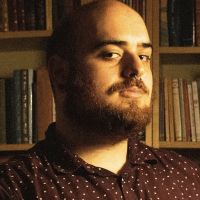
“Marginalized writers are often taught to think our narratives are too messy, nonlinear, or cyclic under the gaze of western imagination—a mindset which naturally leads to trapping ourselves in our own heads. My Poetry began with the communities that pulled me out of my own head at my worst moments: from slam poets who Held me, to Arab/BIPOC spaces (e.g. RAWI, Kundiman) who continue to challenge my imagination. My Poetry began when I found permission to lean into mess, contradiction, and multitudes; to bend the rules of space, time, and the relation between; to construct the landscape of an open page where my language could not just exist, but warp and thrive. When I find myself coming back to a concept or image, I try to channel that energy into a Returning—a leaning into instead of a refusal, the way all spells & divinities boil down to repetition. The nature of speaking among is also that of troubling and interrogating every formerly inhabited word, poem, or self when necessary. I often turn to palinodes, not for poetic formal inspiration, but as a mindset for building conversations among my former selves. When I say speaking among, I do not just mean living and present community, but also community that has passed through earth before us: With whom are we forming literary lineage? Whose words are we carrying with us into our own?”
—George Abraham, author of Birthright (Button Poetry, 2020)
Photo credit: Katytarika Bartel






